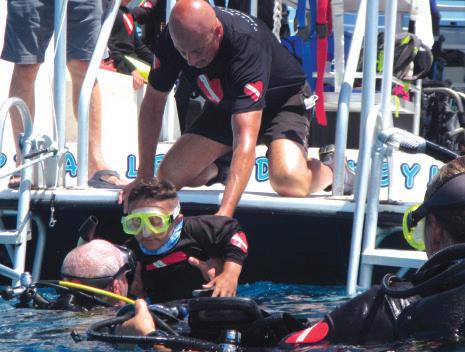
5 minute read
DIVEHEART
Team up BY MIKE ELLIS A unique partnership to study the effects of deep-sea scuba-diving on people with autism ? spectrum disorders
Many partnerships between people from different organizations work as or more seamlessly than intraorganizational relationships.
In October, we reviewed the medical research of Dr. Milan Mrksich, a Hinsdale resident and professor at Northwestern University, and observed how naturally his group’s work aligns with and furthers the objectives of pharmaceutical companies in developing drugs.
Downers Grove-based non-profit organization Diveheart, which extends deep-sea scuba-diving opportunities to individuals with disabilities in the Chicagoland area, has established a similar partnership with Mark Kovic, associate professor in the college of health sciences at Midwestern University.
Like Mrksich, Kovic’s work centers on research, and in his specialty area of occupational therapy, Diveheart has furnished ample materials for test subjects.
“Right after I started Diveheart, I knew intuitively that we wanted to do research,” Diveheart founder Jim Elliott said, adding that research studies “build credibility for the program.”
Roughly ten years ago, Elliott said

Top photo: Diveheart leaders with Ahmadi Belquis; Above: Mark Kovic, associate director and associate professor, doctorate of occupational therapy program in the College of Health Sciences at Midwestern University
he approached Midwestern University, disabilities. (Essentially, self-efficacy adapted soccer. and after working with several other refers to the confidence individuals “What we’re taking from that is, researchers, discovered that “Mark feel in their personal autonomy and both groups were equal, such that to was the right person” to work with independence.) us it seems like the activity they were Diveheart. This study incorporated both involved in made the difference,” he
“I was approached by one of the adapted scuba-diving and soccer, said. physical therapy faculty here, who had with all of the former subjects being When asked whether he would like been doing research on lung capacity evaluated through Diveheart. to see more physiological data buttress related to divers with Diveheart,” said The Diveheart respondents suffered his research findings, Kovic said that is Kovic, who started at Midwestern in from a variety of disabilities, ranging not his primary concern.2009, and traced his relationship with Diveheart to 2010 or 2011. ... “What I quickly learned was that there was a unique contribution that I might be able to make.” According to Kovic, occupational therapists take a “holistic approach” when evaluating their subjects, and after having seen roughly 800 people across a variety of conditions and ages, they realized that “there’s a lot we have to learn.” “We’re fortunate that they’re right here in our backyard in Downers Grove,” he said. “I think it’s a hidden gem right here, and a lot of what I’ve been able to do with Diveheart is learn that it’s not just about the diving, but it’s more about the intangible.” Recently, students pursuing master’s and doctorate degrees at Midwestern have been researching individuals with disabilities, and the impact of diving and other physical activities on their conditions. One study, which focused specifically on the effects of scuba-diving on from autism spectrum disorder and cerebral palsy, to bipolar disorder, ADHD and visual impairment from neurofibromatosis. According to Kovic, five of the six respondents viewed diving as both a group and individual sport, while the sixth identified it predominantly as a group sport. When asked why they considered it as such, the Diveheart participants replied that they were ? “The power of qualitative data comes from when you analyze the data, and then take it back to the subjects, and get their points of view on it.” - MARK KOVIC “Am I curious about that as an area that we haven’t seen—absolutely,” he said. Elliott said he has been very pleased with the partnership his organization has forged with Kovic and his fellow researchers at Midwestern. “I think Midwestern University has been an incredible supporter, and what they’ve done is motivate other medical universities to get involved,” he said. Kovic expressed a similar sentiment regarding extending his research to work with other organizations in the area. “It would be good if we could partner with others; I’m always looking to do that,” he said. Irrespective of the research component, Kovic offered effusive praise for Diveheart, and said he looks forward to continuing the partnership he has cultivated, and learning more about the benefits that individuals with disabilities can derive from therapeutic activities like deep-sea scuba-diving. children on the autism spectrum, found that the subjects reported gaining confidence, “sensory freedom” and other quality of life improvements through diving. diving together, in a group. Respondents from the same study reported that diving made them “more self-aware,” provided a “sense of belonging,” assisted with “It’s one of the most powerful, committed, professional service organizations that I’ve ever been involved with,” he said. ... “For me to have been connected with them for so
“The power of qualitative data comes problem-solving and benefited social long now, I like to think we’re just at from when you analyze the data, and participation. the beginning of unpacking what can then take it back to the subjects, and get their points of view on it,” Kovic On a general self-efficacy scale, which be done for people with disabilities.” said. represents a self-report of how someone feels about their own usefulness,
According to Kovic, this particular Diveheart respondents scored a 73 study has not been replicated, but it percent on average, as opposed to is one that he would be interested in the adapted soccer respondents, who revisiting down the road. scored a 60.
Another student study took a more Since the ages and conditions of the general approach, attempting to assess subjects varied considerably, Kovic said the impact participation in adapted the study suggested that adapted scubasports had on what is termed the diving is a more productive activity “self-efficacy” of adolescents with for individuals with disabilities than For more information about Diveheart, visit www.diveheart.org.
C ompassionateC are
SERVING THE COMMUNITY SINCE 1984.
60 S GRANT STREET | HINSDALE | 630.323.0275 SULLIVANFUNERALHOMEHINSDALE.COM
We’re dedicated to providing personalized, professional and compassionate services to help lighten your burden and support you through the difficult times that follow the loss of a loved one. You ? can rely on us to provide your family with the highest quality care and service in your time of need.


Terrence M. Sullivan and Brian D. Sullivan



LIKE US
WE INVITE YOU TO LIKE US ON FACEBOOK!
FACEBOOK.COM/ THE HINSDALE MAGAZINE










